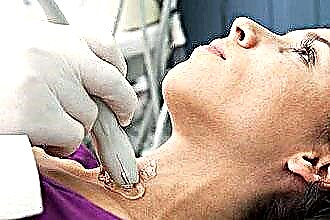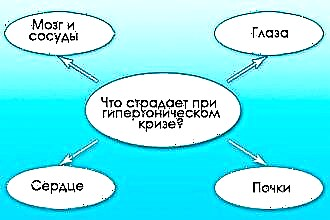If a person experiences a tightness in the pharynx and a feeling as if a foreign object is stuck in there, then they often talk about such a symptom as a lump in the throat. In such situations, there are complaints of choking, difficulty swallowing food, fear and constant stress. There are many reasons for this symptom, it can be various kinds of infectious diseases, problems with the thyroid gland, neurological disorders. Therefore, if a lump appears in the throat, it is difficult to breathe and it is difficult to swallow, it is necessary to urgently undergo an examination and begin treatment.
Causes
 There are many reasons for the feeling that there is a lump in the throat and it is difficult to breathe. Moreover, more often a similar symptom occurs in women. The problem may appear for the following reasons:
There are many reasons for the feeling that there is a lump in the throat and it is difficult to breathe. Moreover, more often a similar symptom occurs in women. The problem may appear for the following reasons:
- frequent psycho-emotional overload;
- disorders in the thyroid gland;
- chronic diseases of the nasopharynx;
- weakness of the muscular corset of the collar zone;
- malfunctions of the esophagus;
- the consequences of taking medications.
Most often, tightness in the throat occurs due to nervous disorders. In this case, the symptom is called a nervous coma.
Severe stress, overwork, insufficient sleep, all of this can be a cause that causes discomfort.
Goiter or enlargement of the thyroid gland is also a fairly common pathology that causes a feeling of tightness in the throat and suffocation. An enlarged thyroid gland makes it difficult for air to pass through, causing a feeling of a lump.
Chronic diseases of the nasopharynx, such as pharyngitis, can also cause an unpleasant symptom. A lump in the throat is felt in osteochondrosis of the cervical spine, as well as in vegetative-vascular dystonia.
Disturbances in the work of the esophagus often cause a pathological condition. In this case, gastric juice and its other contents are thrown into the esophagus, the disease is accompanied by heartburn, discomfort in the throat.
The use of certain medicinal substances also causes tightness in the throat, difficulty breathing, and difficulty swallowing food and saliva. These medications include antihistamines, blood pressure medications, and antidepressants.
Rarely enough, the reason for the feeling of a coma in the throat is a hernia, cough, overweight and other chronic or untreated diseases.
In order to understand the cause of the shortness of breath, it is necessary to seek the advice of a specialist. After a comprehensive examination and the appointment of various diagnostic procedures, the doctor will be able to prescribe adequate treatment. This may require:
- make blood for clinical and biochemical analysis;
- conduct an ultrasound examination of the thyroid gland, organs of the digestive system;
 chest and bronchial x-rays;
chest and bronchial x-rays;- computed and magnetic resonance imaging.
Self-medication with constriction in the throat is unacceptable, as it can be fraught with complications.
If, as a result of the examination, the doctor did not reveal any serious organ pathologies that could cause a lump in the throat, then the main factor causing an unpleasant symptom in this case is frequent stressful situations, depression, anxiety, anxiety and other psycho-emotional overload. If pathologies of internal organs were found that caused difficulty breathing, then appropriate treatment will be prescribed, aimed not so much at eliminating the symptom as at treating the cause that caused it.
Symptoms
The symptom of a foreign object in the throat that makes it difficult to breathe begins with mild perspiration, causing discomfort when swallowing saliva and eating food. In the absence of timely treatment, the situation is aggravated, it becomes difficult to eat, the patient eats only liquid food. As the disease progresses, a lump in the throat will make it difficult not only to eat but also to breathe. Often, such a situation causes fear in a person, fear of suffocation, thoughts about a possible cancer.
There will be a lump in the throat until the doctor finds the cause of the disease and prescribes effective treatment.
In the later stages of the disease, the tightness in the throat may worsen, it becomes problematic to swallow saliva, shortness of breath occurs, and suffocation attacks occur. Often in this state, the patient experiences panic attacks.
A rapid pulse, severe pain in the pharynx, and a feeling of tightness in the region of the heart join the above symptoms. Severe depression and fear of suffocation only exacerbate the situation.
Treatment
 After the diagnosis is made and the cause that caused the unpleasant symptom is named, appropriate treatment will be prescribed.
After the diagnosis is made and the cause that caused the unpleasant symptom is named, appropriate treatment will be prescribed.
So, if the disease is of a psychological nature, therapy will consist in the appointment of antidepressants, tranquilizers, sedatives, in the normalization of work and rest, a complex of procedures using psychotherapeutic techniques. The increased excitability is relieved with the use of vegetotropic drugs, calcium supplements, vitamins are prescribed. A psychotherapist will deal with the treatment.
Traditional medicine can also be used to enhance drug therapy and reduce unpleasant symptoms. For example, decoctions and infusions of medicinal herbs such as chamomile, linden and mint help calm the nervous system, relieve stress, and improve sleep.
At the first symptoms of throat tightness, you can try the following:
- try not to be nervous, take a few deep breaths, calm down, because this symptom is treatable;
- control the swallowing process, make sure that the frequency of swallowing does not increase;
- if there is a desire to swallow, it is better to drink mineral water or a soothing warm herbal decoction in small sips;
Important! Any liquid that will be consumed by a patient with symptoms of a lump in the throat should be warm so as not to cause additional irritation and muscle spasm.
- at the first signs of tightness in the throat, to reduce the severity of the symptom, you can lubricate the surface of the larynx with vegetable oil;
- if the symptom persists, see a doctor immediately.
Difficulty breathing with osteochondrosis
Difficulty breathing, shortness of breath, feeling of a lump in the throat or a foreign object, loss of appetite are often the result of spinal diseases. Similar symptoms can also occur with nervousness and stress, but in this case they quickly disappear. If the cause of the pathology is osteochondrosis of the cervical or thoracic vertebra, then the feeling of tightness in the throat and lack of air will be almost constant and will not disappear after the normalization of the psycho-emotional state.
When the nerves of the cervical spine or phrenic nerve are pinched, which are responsible for the proper functioning of the pharynx, esophagus and respiratory muscle, there is a feeling of constriction, a false feeling of the presence of a foreign object in the throat, diaphragm spasms, and disturbances in the depth of breathing are formed. Drinking plenty of fluids or trying to make up for the lack of oxygen by going out into fresh air does not bring a positive result.
If treatment is not started on time, the disease progresses, there is shortness of breath, heaviness in breathing and even choking. In this situation, the patient needs urgent medical attention.
In order to cope with shortness of breath, a complex of therapeutic measures is needed; the disease cannot be treated symptomatically. Sedatives or antispasmodic drugs are used only in emergency cases when there is a threat of suffocation or attacks of panic attacks. General therapy should not be directed towards the treatment of the spine. Correct and adequate treatment makes breathing easier, promotes the disappearance of other unpleasant symptoms, and normalizes sleep and appetite.
The complex of therapeutic measures for osteochondrosis usually includes:
- regular massage sessions;
- therapeutic and prophylactic physical education;
- physiotherapy;
- the use of B vitamins;
- the use of drugs.
You can also use the methods of alternative medicine: leech therapy and acupuncture. For the prevention of osteochondrosis, an active lifestyle should be observed. The correct mattress and pillow will be the key to a successful recovery.

 chest and bronchial x-rays;
chest and bronchial x-rays;

